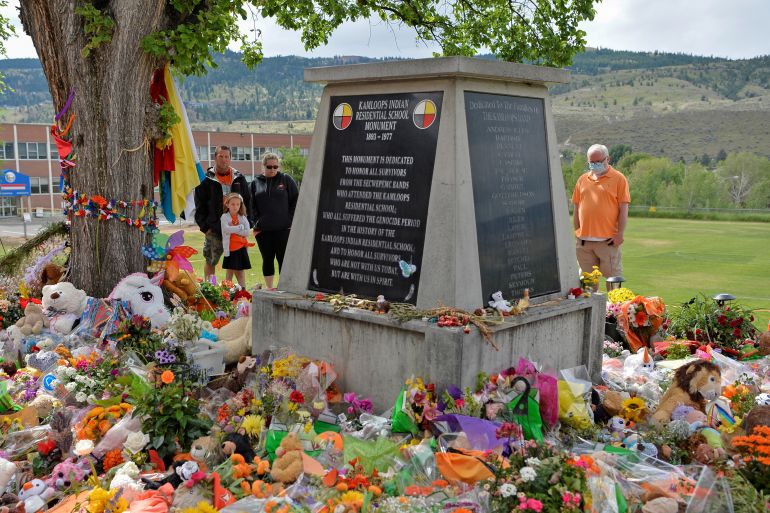Canada: China seeks probe into Indigenous children’s remains
Joined by Russia, Iran, North Korea and other allies, China calls on the UN Human Rights Council to investigate.

China and its allies called on Tuesday for an independent investigation into the discovery last month of the remains of more than 200 Indigenous children at a Canadian boarding school.
The remains of 215 children, some as young as three years old, were found in British Colombia at the site of the former Kamloops Indian Residential School, a discovery Prime Minister Justin Trudeau described as heartbreaking.
Keep reading
list of 4 itemsCanada: Calls grow to uncover more residential school mass graves
Canada to Indigenous women: ‘Our systems have failed you’
Canada PM slams church amid call for probe into Indigenous deaths
“We call for a thorough and impartial investigation into all cases where crimes were committed against the Indigenous people, especially children, so as to bring those responsible to justice, and offer full remedy to victims,” Jiang Duan, a senior official at China’s mission to the UN in Geneva, told the Human Rights Council.
He read the statement out on behalf of countries including Russia, Belarus, Iran, North Korea, Syria and Venezuela. Canada later delivered a joint statement on behalf of more than 40 countries calling for access to China’s Xinjiang region to look into alleged mass detention of Uighur Muslims.
Trudeau, condemning what he called “the systemic abuse and human rights violations” in Xinjiang, said a Canadian truth and reconciliation commission had worked from 2008 to 2015 to address the mistreatment of the indigenous population.
“Where is China’s truth and reconciliation commission? Where is their truth? Where is the openness that Canada has always shown and the responsibility that Canada has taken for the terrible mistakes of the past?” Trudeau asked.
“China is not recognising even that there is a problem … that is why Canadians and people from around the world are speaking up for people like the Uyghurs,” Trudeau told reporters in Ottawa.
Canada’s residential school system, which forcibly separated Indigenous children from their families, constituted “cultural genocide”, the commission that Trudeau referenced concluded in 2015.
Leslie Norton, Canada’s ambassador, told the council that what happened at the Kamloops school was “neither an exception nor an isolated incident” and that Indigenous children had suffered severe injustices and mistreatment over decades.
“As Prime Minister Trudeau recently stated, we also acknowledge that Indigenous people still face systemic racism, discrimination and injustices,” she said, adding that it was addressing issues and supporting communities.
The discovery of the children’s remains in Canada’s westernmost province reopened persistent wounds for First Nations, Métis and Inuit, especially residential school survivors and their families.
Canada formally apologised for its residential school system in 2008, and as part of a class-action settlement with survivors, more than $2.68bn ($3.23bn Canadian) in compensation has been paid to more than 26,700 claimants, according to a report issued earlier this year.
Trudeau, who campaigned on a promise to relaunch Ottawa’s relationship with Indigenous people, said earlier this month that the mass grave found at Kamloops residential school was “a painful reminder of that dark and shameful chapter of our country’s history”.